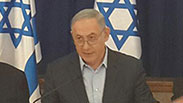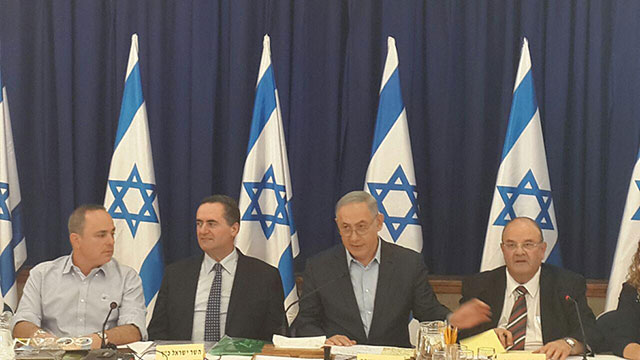
Netanyahu: Golan Heights will forever remain part of Israel
In special government meeting in the Golan, the prime minister vows to keep the area under Israeli rule and promises to aid in its development.
Israel captured the Golan Heights in the 1967 Six-Day War and officially annexed it in 1981, in a move that has not won international recognition.
"In the 19 years the Golan was under Syrian occupation, it was used for bunkers, barbed wire fences, landmines, and aggression. It was used for war. In the 49 years it has been under Israeli rule, it has been used for agriculture, tourism, economic initiatives, construction. It is being used for peace," Netanyahu said during a special government meeting in the Golan Heights.
"I chose to hold this special government meeting in the Golan Hights to send a clear message. The Golan Heights will forever remain in Israel's hands," the prime minister stated.
The Golan's population, he said, was growing every year, with some 50,000 people currently residing there and "thousands of families that are supposed to join them in the coming years."
Netanyahu vowed to keep supporting and strengthening the residents of the Golan, its towns and cities, industry, agriculture, and more. "Including decisions we'll make in this government meeting," he added.
The prime minister urged the international community "to recognize finally that the Golan will remain permanently under Israeli sovereignty."
He noted that the Golan was an integral part of the Land of Israel in ancient times, "as evidenced by the dozens of ancient synagogues around us," and that the Golan is also an integral part of Israel in current times.
He spoke of the war and destruction on the Syrian Golan, saying he told US Secretary of State John Kerry that he "doubted Syria will ever return to what it once was."
The prime minister said he told Kerry that Israel would not pose objections to any diplomatic agreement in Syria so long as it does not compromise the State of Israel's security. "Meaning, at the end of the day, Iran, Hezbollah and ISIS forces must be expelled from Syrian territory."
Iran, one of Israel's main foes, as well as Tehran's Lebanese proxy, Hezbollah, have supported Syrian President Bashar Assad in the conflict against rebel forces and Islamic State militants.
Justice Minister Ayelet Shaked reiterated the prime minister's statements, saying "one of the goals of this meeting is really to publicly declare that we expect the world's nations to also recognize Israel's northern border as an international border, including the Golan Heights of course."
Syrian Deputy Foreign Minister Faisal Miqdad rejected Netanyahu's remarks, saying "The occupied Golan is Arab land according UN Security Council resolutions."
"We are prepared (to do) everything to restore the Golan employing all necessary means including military means," he added.
Meanwhile, pro-regime press published a message on behalf of the "Syrian residents of the occupied Golan", which said, "The visit of the racist and facist Netanyahu government will not change the position of the perserverant Golan residents."
The Syrian Foreign Ministry also sent two letters to the UN Secretary General condemning the Israeli cabinet meeting. The letter said, "Syria condemns in the strongest terms the holding of a provocative meeting of the occupation government in the occupied Syrian Golan. Syria emphasizes that the meeting is null and void. Syria calls on the UN and the UN Security Council to intervene immediately and to condemn the irresponsible meeting, and demand that the meeting that took place on Syrian soil not happen again."
Officially, the Golan was chosen as the venue for the cabinet session as a way to mark the anniversary of Netanyahu's election victory a year ago.
But the timing was seen by some political commentators as linked to talks Netanyahu is due to hold with Russian President Vladimir Putin on Syria, where Moscow's military and diplomatic interventions are crucial.
Though Russia is committed to keeping Syria intact under Assad, it has not publicly broached the future of the Golan.
"Whatever happens beyond the border, the (Golan) line is not going to change," Netanyahu said, in his remarks on his conversation with Kerry.
Having sent in Russian forces last year to turn the tide against a rebellion raging since 2011, Putin, who meets Netanyahu in Moscow on Thursday, wants to preserve Assad's central rule as part of national reconciliation efforts. Other powers want him gone.
While formally neutral on the civil war next door, Israel has predicted Syria's sectarian partition is inevitable.
Past US-backed Israeli-Syrian peace efforts were predicated on a return of the Golan, where some 23,000 Israelis now live alongside roughly the same number of Druze Arabs loyal to Damascus.
Reuters contributed to this report.











